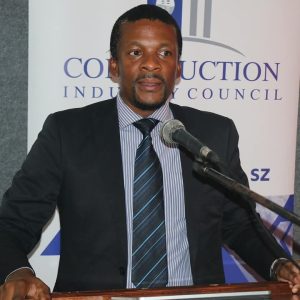By Delisa Magagula
In a groundbreaking initiative aimed at advancing Eswatini’s renewable energy sector, the Construction Industry Council (CIC) and the University of Eswatini (UNESWA) have launched the Solar Installation and Maintenance Training Programme under the STEM Power initiative.
The programme is designed to address the country’s skills gap in energy technology, aligning with Eswatini’s long-term sustainability and energy security goals.
The initiative was officially introduced during the launch of the Plant Study at the Solar Installation and Maintenance Workshop on March 25, 2025.
Key stakeholders from the construction and energy sectors convened to provide input on the programme’s structure and feasibility.
The workshop validated the curriculum and encouraged industry professionals to participate in a small-scale pilot run, scheduled to commence in June 2025, before a full rollout in the next financial year.
RELATED: CIC and Stakeholders to ease compliance terms
As Eswatini moves towards reducing its reliance on imported electricity currently accounting for approximately 80% of the country’s energy supply the demand for skilled professionals in solar technology has surged.
With 2,800 hours of sunshine annually and strong radiation levels averaging 4.8 kWh/m²/day, Eswatini has immense potential for solar energy development. However, a shortage of trained personnel has hindered progress in the sector.
CIC CEO Maqhawe Mnisi emphasized the importance of professionalizing the industry through standardized training and certification programs.
He noted that equipping the workforce with specialized skills was crucial to ensuring high-quality installations and maintenance practices.
“This initiative, in collaboration with UNESWA’s Electrical Engineering Department, is just the beginning. We plan to extend similar programs to vocational training institutions such as ECOT, VOCTIM, and Limkokwing University,” Motsa stated.
The six-month training programme will combine 30 days of intensive classroom learning with hands-on experience in solar photovoltaic system design, installation, maintenance, troubleshooting, and compliance with local energy regulations.
Participants will gain industry-recognized certification, enhancing their employability and strengthening Eswatini’s transition to clean energy.
The training targets local contractors, electricians, and construction professionals, equipping them with the expertise to install and maintain solar energy systems across residential, commercial, and industrial sectors.
The CIC has allocated E200,000 in funding to procure essential equipment to support UNESWA in offering the course.
UNESWA Vice-Chancellor, Professor Justice Wala, highlighted the broader impact of the programme, stating that the partnership represented a significant step towards achieving Eswatini’s energy independence.
“By investing in skills development, we are building a sustainable future that aligns with global clean energy targets, including the Sustainable Development Goal of affordable and clean energy,” he said.
The initiative also aims to strengthen collaboration between academic institutions, industry players, and policymakers to enhance regional competitiveness.

Challenges such as limited awareness, outdated training methodologies, and financial constraints are being addressed through targeted solutions, including awareness campaigns, government incentives, and industry-backed funding models.
The CIC and UNESWA have encouraged contractors and industry professionals to take advantage of this initiative and contribute to Eswatini’s clean energy transformation.
Stakeholders are invited to provide ongoing feedback to ensure the programme meets both industry and national development needs.
As Eswatini moves towards achieving 50% renewable energy in its national mix by 2030, this training programme marks a critical milestone in preparing the local workforce to meet the challenges and opportunities of a rapidly evolving energy landscape.
For more information on enrollment and programme details, interested parties can contact the Construction Industry Council’s Research, Training, and Business Development Department or UNESWA’s Electrical Engineering Department.
Noteworthy is that Eswatini has set ambitious energy goals to enhance sustainability, reduce dependence on energy imports, and transition towards a greener economy.
With the country currently importing approximately 80% of its electricity, the government aims to achieve energy independence while meeting growing domestic and industrial energy demands.
RELATED: CIC, ECA join forces to empower contractors with essential training
A key target in Eswatini’s energy strategy is increasing the share of renewable energy in the national grid.
The National Energy Policy and the Eswatini Energy Master Plan outline the country’s vision to generate at least 50% of its electricity from renewable sources by 2030.
This includes investments in solar, biomass, hydro, and wind energy projects.
To support this transition, the government has introduced policies to attract private sector investments and partnerships.
The Renewable Energy Independent Power Producer Procurement Programme (REIPPPP) is designed to encourage local and international investors to develop clean energy infrastructure.
Additionally, Eswatini is implementing net metering regulations to enable households and businesses to generate and sell excess solar power back to the grid, promoting decentralized energy production.
The country is also focusing on improving energy efficiency and affordability. The introduction of smart grids,energy-saving appliances, and sustainable industrial practices will help reduce overall consumption and cut costs for consumers.
Furthermore, Eswatini is expanding vocational training and education initiatives, such as the Solar Installation and Maintenance Training Programme, to equip local professionals with the skills needed to support the renewable energy sector


